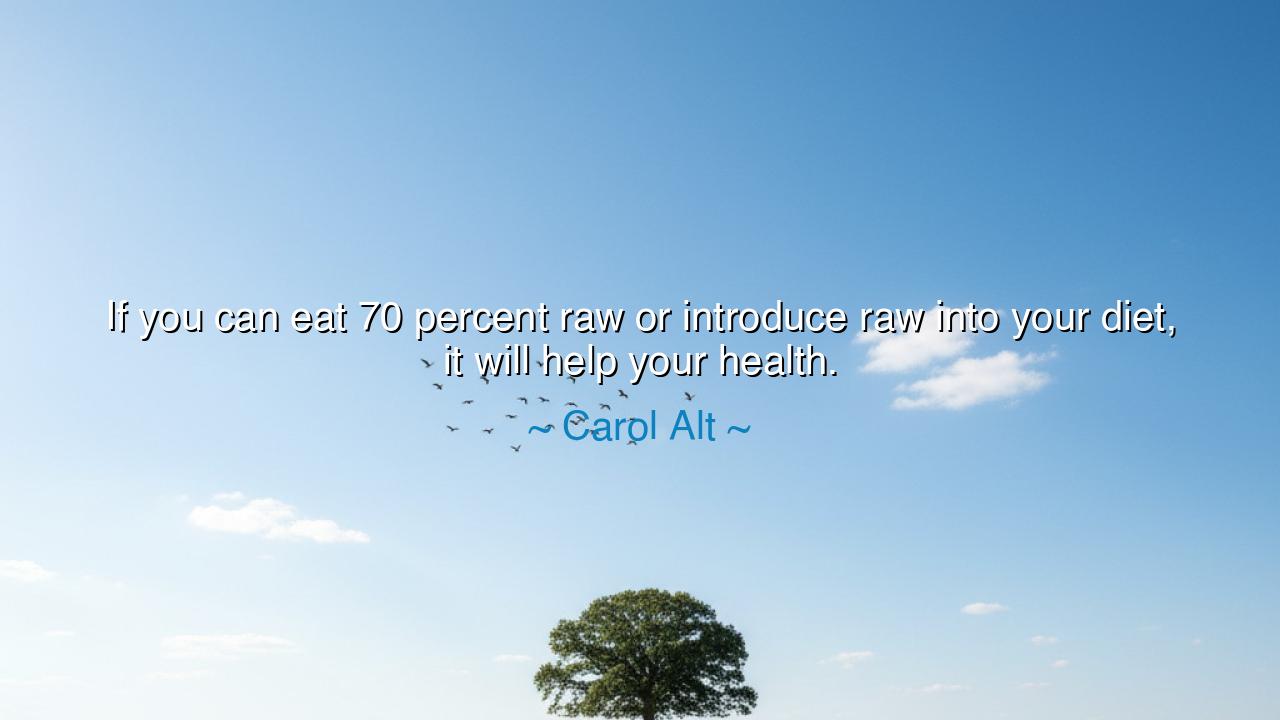
If you can eat 70 percent raw or introduce raw into your diet, it
If you can eat 70 percent raw or introduce raw into your diet, it will help your health.






In the gentle yet wise words of Carol Alt, we are offered a truth that feels both ancient and alive: “If you can eat 70 percent raw or introduce raw into your diet, it will help your health.” At first glance, her words may seem practical, even simple—advice from one who has long walked the path of wellness. But beneath this simplicity lies a profound lesson: the closer we remain to nature, the closer we remain to life itself. Her teaching is not merely about food—it is about the harmony between man and the earth, about remembering the purity of what sustains us and the wisdom of the natural order from which we came.
To eat raw is to partake of food in its most honest form, unaltered by fire, untouched by artifice. It is to consume not just matter, but vitality—the living essence that nature herself has prepared for the nourishment of all beings. The ancients understood this, though they spoke of it differently. In the gardens of Eden, man’s first diet was raw—the fruit from the trees, the herbs of the field, the seeds that carried within them the potential of generations. Fire came later, bringing mastery but also distance. It civilized humanity but also drew us away from the rhythms of the earth. Carol Alt’s words echo a yearning for return—to rediscover the purity of what sustains us before it is altered by our restless hands.
When she speaks of eating “70 percent raw,” she calls for balance, not extremity. Her wisdom lies not in demanding a total rejection of the cooked or the crafted, but in reminding us to preserve a portion of the living world within our meals. The number seventy—neither complete abstinence nor indulgence—mirrors the philosophy of moderation taught by sages across time. Aristotle spoke of the “golden mean,” the virtue that rests between excess and deficiency. So, too, does Alt’s counsel rest between the raw and the cooked, between nature and artifice. To eat thus is not a dogma but a discipline—a way of honoring both fire and soil, both civilization and the wild pulse that gave birth to it.
Consider the wisdom of the Japanese, whose diet—rich in fresh fish, vegetables, and fermented grains—has long been credited for their longevity. Even in their most revered dish, sushi, one finds this balance between the raw and the refined, the simple and the sacred. The sea’s gifts are taken in their purest form, and yet presented with art and mindfulness. It is not merely a meal, but an act of gratitude—a reminder that food is not only to sustain the body but to awaken reverence. In this, Carol Alt’s philosophy finds kinship. For she, too, speaks not just of health, but of wholeness—a state where body, mind, and spirit are nourished by what is alive, not what is deadened by excess or neglect.
To eat raw is also to remember the vitality that dwells within us. For the ancients believed that man mirrors nature, and that to consume what is vibrant and living is to renew that same spark within oneself. The philosopher Hippocrates, father of medicine, once declared, “Nature itself is the best physician.” He knew that when we eat what nature provides in its purest state—uncorrupted, unprocessed—we invite healing from within. Carol Alt’s words, then, are not a modern invention but a continuation of that timeless truth: that health is not achieved through mastery over nature, but through alignment with it.
Yet her statement also carries a quiet warning. To eat without awareness, to consume what is stripped of life and laden with excess, is to weaken not only the body but the spirit. The processed food of our age, though convenient, carries the mark of forgetfulness—it severs our connection to the earth’s rhythms and to our own. To “introduce raw into your diet” is therefore more than a nutritional suggestion; it is an act of remembrance. Each fresh fruit, each raw leaf, each simple nut or seed becomes a prayer—a small return to the sacred circle of life.
Let this then be the lesson: to live well, we must eat with reverence. Seek not only what pleases the tongue, but what nourishes the spirit. Let your plate carry the colors of the living world—greens that speak of growth, reds that pulse with energy, yellows that shine with warmth. Do not reject the fire, but remember the soil. And as you eat, give thanks—not in words, but in awareness—that what you consume was once alive, and that its life now sustains your own.
So, in Carol Alt’s humble counsel, we find a truth worthy of the ancients: health is not the pursuit of perfection, but the practice of balance. To eat raw is to honor the breath of life that flows through all things; to eat consciously is to live awake. The one who learns to eat thus—simply, gratefully, and with respect for nature—finds not only strength of body, but peace of heart. For when we eat in harmony with the earth, we do not merely survive—we remember what it means to truly live.






AAdministratorAdministrator
Welcome, honored guests. Please leave a comment, we will respond soon